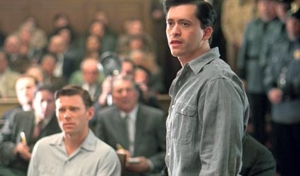
Return to 2006 Films
Alphabetic
Index of 2006
Films
_______________
An Inconvenient Truth
Big Bad Swim
Brokeback Mountain
Capote
Cinderella Man
Crash
The Departed
The DaVinci Code
Eron: The Smartest
Guys in the Room
Good Night and
Good Luck
Half Nelson
History of Violence
Hollywoodland
Hotel Rwanda
Little Miss Sunshine
Journey from the Fall
March of the Penguins
Millons
Million Dollar Baby
Munich
Prairie Home Companion
Prime
Quinceanera
Sideways
Star Wars III:
Revenge of the Sith
Thank You for Smoking
The Three Burials of Melquiades Estrada
The Sea Inside
United 93
War of the Worlds
Walk the Line
World Trade Center
Capote begins with a scene of an isolated farm house in rural Kansas. It’s 1959. A girl discovers a horrible crime: an entire family brutally murdered in their isolated farm house. The shocking crime became the basis for Truman Capote’s famous novel, In Cold Blood. Capote tells the story of the author’s involvement with the story, from the moment he reads the account of the killings in the newspaper until the execution of the killers five years later. When we first meet Truman Capote (a great performance by Philip Seymour Hoffman), he is the toast of New York. The eccentric gay Southerner with his odd voice had become famous with the publication of Breakfast at Tiffany’s. He is immediately drawn to the story. The next day, Capote takes a train to Kansas with his friend and fellow writer Harper Lee (Catherine Keener) to investigate. At first the heartland folk of Kansas don’t know what to make of the eccentric Capote. Lee helps with her down-to-earth demeanor. Eventually, he gains the trust of the townspeople and begins to investigate. At first Capote plans to write the account for The New Yorker. Later, he begins to adapt it for a book. Capote forms a relationship with Perry Smith (Clifton Collins, Jr.), one of the killers. Smith tells him his life story, and eventually, the account of the crime itself. Capote finds a kinship with Smith. Both were products of traumatic childhoods. As Capote puts it, “It’s as if Perry and I grew up in the same house. And one day, he got up and went out the back door, and I went out the front.” As Capote continues to write, the relationship with Smith grows more complex. Capote is drawn to Smith, yet, as a writer, he begins to manipulate him in order to get the story from him. Capote’s editor tells him he can’t publish the book without the killer’s first hand account of the brutal killings. Capote lies and otherwise manipulates Smith in order to get information for the book. Smith calls, writes, and pleads with Capote to find a lawyer who will attempt to commute his sentence. The movie ends with the execution of Smith and his accomplice, Dick Hickock, which Capote witnesses. Capote is frozen with fear and revulsion as the execution nears. Capote tells Lee he did everything he could to help him avoid the execution. She knows that he is telling another lie. After all, the execution brings a fitting closure to the book and the saga of crime and punishment. Capote is a very fine film. Hoffman gives an extraordinarily
complex performance as Truman Capote. Capote is a celebrity, socialite,
eccentric, Southern homosexual. Hoffman masters his accent, but
goes much deeper to show us both Capote’s pain, but also
his narcissism. Even though he has a bond with Smith, he primarily
sees him, not as a person, but as an object who can give him what
he needs to write what he knows will be a sensational best seller.
Even more disturbing is his jealousy of his faithful friend Harper
Lee. When her celebrated novel, To Kill a Mockingbird is made
into a film, Capote sulks at the premiere. Shockingly, he comments,
“Frankly, I don’t know what all the fuss was about.”
Catherine Keener’s fine performance as the down to earth,
loyal Harper Lee stands in dramatic contrast to the narcissistic
Capote. Tom Condon, OP |
 Home | Contact Us | DLC Dominican Life | USA is sponsored by the Dominican Leadership Conference, the networking organization for elected leaders in the USA. Dominican Life | USA © 2002-2007, All Rights Reserved Web Editor: Anne Lythgoe, OP |
|---|



 Director
Bennett Miller and screenwriter Dan Futterman, deserve great credit
for keeping the audience engrossed in the film, especially with
its deeply flawed central character. Capote could easily have
been an exercise in high camp: New York dandy contrasted with
the plain and simple Kansas folks. Instead, it becomes a sobering
examination of how a brilliant, fragile, writer exploits his subject
for a good story. The postscript to Capote reports that, with
the publication of In Cold Blood in 1966, Truman Capote became
the most famous writer in the United States. But what a price
he paid for fame and success. Truman Capote dies from alcoholism
in 1984, a month shy of his 60th birthday, without completing
another work.
Director
Bennett Miller and screenwriter Dan Futterman, deserve great credit
for keeping the audience engrossed in the film, especially with
its deeply flawed central character. Capote could easily have
been an exercise in high camp: New York dandy contrasted with
the plain and simple Kansas folks. Instead, it becomes a sobering
examination of how a brilliant, fragile, writer exploits his subject
for a good story. The postscript to Capote reports that, with
the publication of In Cold Blood in 1966, Truman Capote became
the most famous writer in the United States. But what a price
he paid for fame and success. Truman Capote dies from alcoholism
in 1984, a month shy of his 60th birthday, without completing
another work.